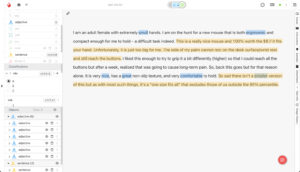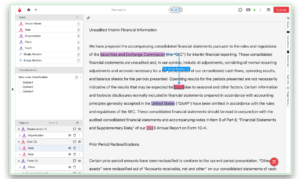Text annotation powers AI applications like chatbots, search engines, large language models (LLMs), and content moderation systems. Accurate annotations such as sentiment labeling, named entity recognition (NER), and relation extraction are essential for improving NLP model accuracy and performance.

What to Look For in Text Annotation Tools:
- Format Support: Should accommodate standard formats such as JSON, TXT, CSV, and XML
- Automation Features: Should include AI-driven entity prediction and pre-labeling suggestions
- Integration Capabilities: Compatible with LLM pipelines and model feedback loops
- Security & Compliance: Supports PII redaction and meets HIPAA standards for clinical data
Top Tools for Text Annotation:
1. iMerit (Ango Hub)
Ango Hub by iMerit provides an enterprise-level platform optimized for complex NLP annotation tasks, combining advanced automation, customizable annotation workflows, and expert annotators specialized in linguistics and domain-specific contexts.

Highlights:
- Supports multiple formats, including JSON, TXT, CSV, XML
- Advanced automation: AI-powered entity prediction and pre-labeling
- Seamless integration with NLP and LLM pipelines
- Expert annotators specialized in nuanced linguistic and contextual annotation
- Robust security, including PII redaction and HIPAA compliance for clinical texts
- Proven workflows for document classification and entity tagging in technology, retail, and insurance sectors
2. Scale AI
Scale AI delivers large-scale managed annotation services with AI-enhanced labeling for consistent quality in NLP applications.
Highlights:
- Scalable annotation workflows across industries and languages
- AI-assisted labeling for improved speed and consistency
- Strong integration with NLP pipelines and ML model training
- Quality assurance through human-in-the-loop validation
- Flexible deployment options, including private cloud
3. Labelbox
Labelbox provides a flexible, enterprise-grade text annotation platform supporting complex NLP tasks with powerful automation and integration capabilities.
Highlights:
- Customizable annotation tools for tasks like NER, classification, and sentiment analysis
- Built-in model-assisted labeling with active learning loops
- Collaboration features for managing large teams
- Integration with Python SDKs and APIs for seamless model feedback
- Enterprise-grade security with SOC 2 Type II compliance
4. Appen
Appen leverages its global workforce to provide multilingual text annotation services suitable for diverse NLP applications.
Highlights:
- Extensive global pool of trained annotators in 180+ languages
- Multilingual text annotation for localization and global LLMs
- ISO-certified quality control workflows
- Domain expertise in regulated sectors such as finance and healthcare
5. SnorkelAI
SnorkelAI specializes in programmatic labeling and automation, enabling rapid creation of annotated datasets for NLP tasks.
Highlights:
- Supports iteration with model-in-the-loop learning
- Significantly reduces reliance on manual labeling through weak supervision
- Integration with Jupyter, Python, and major ML frameworks
- Accelerates dataset creation for model prototyping
6. Dataloop
Dataloop offers robust annotation automation with comprehensive data management tailored for text-based NLP annotation workflows.
Highlights:
- Automated annotation pipelines with feedback-driven model retraining
- Real-time collaboration and QA tracking dashboards
- Integrated data versioning and audit trails
- Modular SDK and API for pipeline customization
- Deployment flexibility across cloud and on-prem environments
7. Cogito Tech
Cogito Tech specializes in high-precision text annotation, including sentiment analysis, NER, and relationship extraction, supported by experienced annotation teams.
Highlights:
- Domain-specialized annotators for legal, healthcare, and e-commerce texts
- Manual and semi-automated workflows for high accuracy
- Rich taxonomy and ontology support
- Multi-tier QA process with linguistic experts
8. Cloudfactory
Cloudfactory provides scalable, managed annotation services focusing on workforce training and consistent annotation quality.
Highlights:
- Dedicated managed teams trained on NLP workflows
- Agile scaling for large enterprise projects
- Emphasis on ethical AI with socially responsible workforce practices
- QA loops are embedded directly into daily annotation workflows
- Integration with enterprise tools via custom APIs
9. SuperAnnotate
SuperAnnotate emphasizes streamlined NLP annotation workflows combined with powerful project management tools.
Highlights:
- Support for entity tagging, document classification, and custom NLP tasks
- Visual workflow builder for process transparency
- Real-time issue tracking and version control
- Integration with major cloud storage and ML platforms
10. Shaip
Shaip excels in multilingual text annotation and scalability, particularly for global NLP projects.
Highlights:
- Extensive multilingual annotation services
- HIPAA and GDPR-compliant for handling sensitive text data
- Full-service data collection, transcription, and annotation
- Human-in-the-loop validation at multiple QA stages
Conclusion:
Selecting the right text labeling tool is essential for building accurate, scalable NLP systems, whether you’re training chatbots, refining LLMs, or handling sensitive clinical data. While each platform in this guide offers strong capabilities, Ango Hub by iMerit stands out for its powerful combination of advanced automation, customizable workflows, and expert linguistic annotation.
With robust compliance features and seamless integration into NLP and LLM pipelines, Ango Hub is a leading choice for organizations seeking high-quality, secure, and efficient text annotation at scale.
